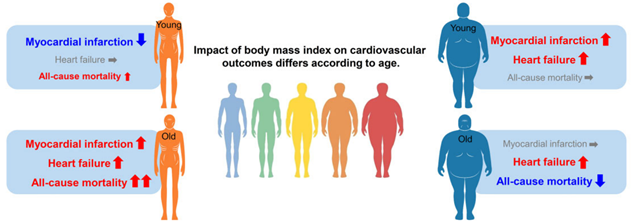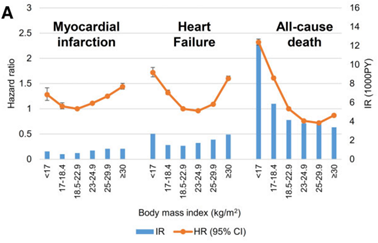The more obese in the younger generation, the higher the risk of cardiovascular disease
- Analyzing the relationship between body mass index and cardiovascular risk according to age in approximately 9.28 million subjects
- The younger and more obese, the higher the risk of myocardial infarction and heart failure; thus, weight management is important
- It is recommended that the elderly maintain slight overweightness as the risk of cardiovascular disease increases in the elderly and underweight.

A recent study has found that the effect of body mass index (BMI), a measure of obesity, on cardiovascular risk varies according to 'age'. Specifically, in younger patients’ obesity increases cardiovascular risk, while in the elderly being underweight results in greater risk of cardiovascular disease, and maintaining a slightly overweight body was found to be helpful in old age.
On September 29th, it was confirmed that the risk of obesity varies according to age as a result of research conducted by a joint research team, Professors Kim Hyung-Kwan & Lee Hyun-Jung of the Department of Cardiology at Seoul National University Hospital and Professor Han Kyung-Do of Soongsil University: a national population-based cohort study of 9,278,433 people without cardiovascular disease using the National Health Insurance Corporation database.
Obesity is a well-known risk factor for atherosclerosis, myocardial infarction, heart failure, and death. On the other hand, low body weight has also been reported to be associated with increased mortality in patients with cardiovascular disease. In other words, it is known that body mass index, a measure of obesity, and death generally have a U-shaped correlation.
However, it is not well known whether the cardiovascular risk according to obesity is the same in all age groups. Accordingly, the research team used the National Health Insurance Service database to track 9,278,433 people without cardiovascular disease among those who underwent health checkups in 2009 to see if the risk of myocardial infarction, heart failure, and death varies according to age group and obesity.
Based on the optimal normal weight (18.5–22.9 kg/m2), the research team analyzed the effects of BMI within the entire population and divided by age group ▲ young people (20-39 years old) ▲ middle-aged people (40-64 years old) ▲ old people (65 years old or older).

[Figure 1] A U-shaped correlation was shown between obesity according to body mass index and the risk of myocardial infarction, heart failure, and death.
As a result, across the total population, obesity and the risk of myocardial infarction, heart failure, and death all showed a U-shaped association with BMI (Figure 1). In particular, obesity or being underweight both increased the risk of cardiovascular disease and death.
On the other hand, the BMI section with the lowest risk for each disease was 'normal weight' (18.5-22.9 kg/m2) for myocardial infarction, 'pre-obesity' (23-24.9 kg/m2) for heart failure and 'mild obesity' for death. (25-29.9 kg/m2).

[Figure 2] Different patterns of obesity and risk of myocardial infarction, heart failure, and death according to body mass index were observed in the young, middle-aged, and old age groups.
In particular, the association between obesity and cardiovascular risk showed a clear difference when classified by age group. Differences were especially evident in myocardial infarction, which is highly related to arteriosclerosis.
The risk of myocardial infarction increased proportionately as the degree of obesity increased in the younger age group (20-39 years old). On the other hand, the middle-aged correlation (40-64 years old) was U-shaped, and for the elderly (age ≥ 65 years old) increased in inverse proportion when underweight.
In addition, a U-shaped relationship was observed between obesity and the risk of heart failure in all age groups. However, while the effect of obesity was more prevalent in the younger age group, the effect of being underweight was found to be stronger in the middle and older age groups.
The BMI interval with the lowest risk of heart failure was 'normal weight' in young people, 'normal weight' or 'pre-obesity' in middle-aged, and 'pre-obesity' in the elderly.
On the other hand, it was confirmed that the risk of death was the lowest in the case of ‘mild obesity’ in all age groups and increased when patients were severely underweight. The association between being underweight and death was stronger in the middle and old age groups than in the young age group.
Indeed, when the age was divided into 10-year-old units and analyzed, the results showed that the association between obesity and cardiovascular risk was different depending on the age group.
For those in their 20s, being underweight did not increase cardiovascular risk, and cardiovascular risk increased as obesity increased beyond the normal range.
On the other hand, in those over 70 years of age, the increase in myocardial infarction and death due to low body weight was more pronounced than the increase in cardiovascular risk due to obesity.
In other words, cardiovascular risk for those who are obese is greater than for those who are underweight in younger people, while cardiovascular risk from being underweight is greater in older adults, the researchers explained.
Professor Kim Hyung-Kwan and Professor Lee Hyun-Jung of the Cardiology Department said, "It is important for young people to control their weight so that they do not become obese, and for obese young people to lose weight."
Meanwhile, "In the elderly, the risk of cardiovascular disease and death increases with weight loss linked to muscle loss, so proper exercise and diet are recommended to prevent such weight loss.”
The results of this study were published in the latest issue of the European Journal of Preventive Cardiology, an international journal published by the European Society of Cardiology.

[Pictures from left] Seoul National University Hospital Department of Cardiology, Prof Kim Hyung-Kwan · Prof Lee Hyun-Jung, and Soongsil University Prof Han Kyung-Do